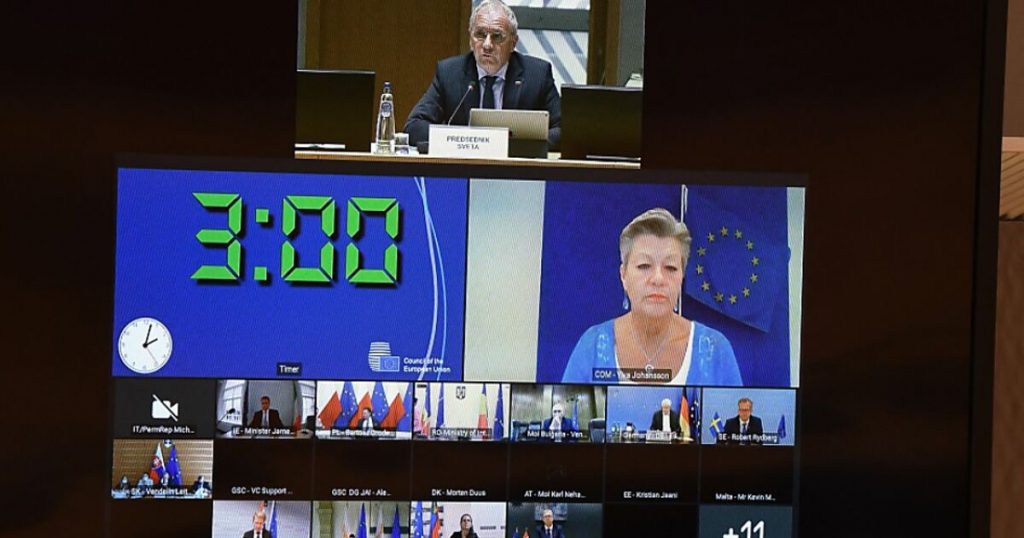In a video conference, EU Home Affairs Commissioner Ylva Johansson urged EU interior ministers to establish legal and safe escape routes from Afghanistan to Europe. On Wednesday, Interior Minister Karl Nehamer spoke out against accepting more refugees and insisted that criminal and rejected Afghan asylum seekers continue to be deported. Greece has positioned itself similarly. Sharp criticism came from Luxembourg.
“It is clear that the situation in Afghanistan is not secure and will not be for some time,” Johansson said at the meeting, according to a statement released on Wednesday. According to her, 80 percent of the people forced to flee are women and children. About 550,000 Afghans have been displaced within the country since the beginning of the year, in addition to the 2.9 million who previously fled within the country.
Nehamer stressed that “Austria continues to deport Afghans in accordance with European law.” It is scheduled to propose at today’s meeting the establishment of deportation centers in the countries neighboring Afghanistan. The EU should give the target countries ‘framework conditions’ and ‘negotiating on an equal footing’.
And the Greek Minister of Migration, Notis Mitarachi, suggested bringing rejected asylum seekers to Turkey: “We consider Turkey a safe country for Afghan citizens.”
On the other hand, Luxembourg Foreign Minister Jean Asselborn called for imposing quotas for refugees from EU countries. “We need quotas for refugees from Afghanistan who can come to Europe legally,” he told the German Liberation Network. Regarding the statements of his colleague Nehamer, Luxemburger said: “This is terrible. He is desperate. Such populist phrases only raise fear.” This is not a common European policy, but it is “only domestically motivated”. We cannot shoot Afghanistan on the moon.”
The charity Oxfam called on European governments to “ensure the urgent evacuation of all people at risk from Afghanistan”. It was also their duty to “refrain from any form of forcible return to Afghanistan and protect Afghan nationals on the move,” said Oxfam’s migration expert, Raphael Shelhav.
The special meeting of EU interior ministers was originally called due to the situation at the border between the EU country Lithuania and Belarus (Belarus). Belarusian head of state Alexander Lukashenko has been accused of pulling migrants, mostly from the Middle East, into Lithuania.
According to the Presidency of the Slovenian Council, the discussion about the possible increase in the number of refugees who might come to Europe due to the situation in Afghanistan was not on the agenda. Work is underway to discuss the matter at a separate date.
Because of the large number of illegal immigrants, Poland now uses the army on its border with Belarus. Defense Minister Mariusz Blaszczak wrote on Twitter that more than 900 soldiers will strengthen the Polish border guards.
At the meeting, EU interior ministers expressed their solidarity with the countries affected by the problem. In the evening, Slovenian Interior Minister Alice Hojs said it had been agreed to send additional experts and equipment to these countries and to ask the European Union Commission for additional funding.
After the Taliban captured Kabul on Sunday, the Afghanistan issue has become increasingly prominent. The EU Commission announced that Foreign Affairs Representative Josep Borrell and Interior Commissioner Johansson will report to the interior ministers “on the latest developments in Afghanistan, focusing on political, humanitarian and migration issues”.

“Food practitioner. Bacon guru. Infuriatingly humble zombie enthusiast. Total student.”








More Stories
Kyiv: Russian Kursk offensive halted
US Presidential Election: Former US Government Officials Warn Against Donald Trump's Election
Netherlands wants to leave asylum system